Cremation, Caste, and Cosmogony in Karmic Traditions.
Cremation, Caste, and Cosmogony in Karmic Traditions.
Cremation, Caste, and Cosmogony in Karmic Traditions.
Create successful ePaper yourself
Turn your PDF publications into a flip-book with our unique Google optimized e-Paper software.
For the welfare of creatures, the waters have been evolved by Siva as their ultimate resort. The waters alone<br />
constitute Bhu, Bhuvah, Svah, anna (cooked rice) as well as nectar. The waters are the vital breaths of the worlds, the<br />
liv<strong>in</strong>g be<strong>in</strong>gs, the worlds themselves. On what avail is much talk? The world of mobile <strong>and</strong> immobile be<strong>in</strong>gs is<br />
constituted by the waters.<br />
Lord Siva is the overlord of the waters. He is glorified as such. The universe is identical with him. What is<br />
there to wonder at <strong>in</strong> this? The designation Narayana was acquired by Visnu by the grace of the waters. Visnu is the<br />
abode of worlds <strong>and</strong> waters constitute his abode. When the mobile <strong>and</strong> immobile be<strong>in</strong>gs are be<strong>in</strong>g burned by the fire<br />
<strong>and</strong> tossed up as smoke by the w<strong>in</strong>d, the vapours that go up urged by the w<strong>in</strong>d from the clouds (L<strong>in</strong>ga-Purana I, 54:34-<br />
38, p. 212-213).<br />
Hence the mixture of smoke, fire <strong>and</strong> w<strong>in</strong>d is called cloud. The word abhra (cloud) is derived as follows:<br />
“that which showers water”. The lord of the clouds is the thous<strong>and</strong>-eyed Indra. The clouds orig<strong>in</strong>ated from sacrifical<br />
smoke is conductive to the welfare of the twice-born. The cloud orig<strong>in</strong>at<strong>in</strong>g from the smoke of the forest fires, is<br />
conductive to the welfare of the forests (L<strong>in</strong>ga-Purana I, 54:39-40, p. 213).<br />
O brahm<strong>in</strong>s. The clouds orig<strong>in</strong>at<strong>in</strong>g from the smoke of the dead bodies br<strong>in</strong>gs about evil. The clouds<br />
orig<strong>in</strong>at<strong>in</strong>g from the smoke of the fire dur<strong>in</strong>g magic rites br<strong>in</strong>gs about the destruction of liv<strong>in</strong>g be<strong>in</strong>gs (L<strong>in</strong>ga-Purana I,<br />
54:41, p. 213).<br />
The moon <strong>in</strong>creases <strong>in</strong> force <strong>in</strong> the beg<strong>in</strong>n<strong>in</strong>g of the bright half <strong>and</strong> is stationed <strong>in</strong> the way of the sun. Day by<br />
day it gets refilled till the end that half. The sun develops <strong>and</strong> nourishes it. It is drunk up by Devas dur<strong>in</strong>g the dark<br />
half. It is be<strong>in</strong>g drunk <strong>in</strong> the cont<strong>in</strong>uity for fifteen days by Devas. The sun refills it part by part by his s<strong>in</strong>gle ray<br />
Susumna: Thus the physical body of the moon is developed <strong>and</strong> nourished by the vigour of the sun (L<strong>in</strong>ga-Purana I,<br />
56:4-6, p. 222).<br />
On the full moon day it appears with its full white disc. Beg<strong>in</strong>n<strong>in</strong>g with the second <strong>and</strong> end<strong>in</strong>g with the<br />
fourteenth day <strong>in</strong> the dark half, Devas dr<strong>in</strong>k up the moon that was nourished <strong>and</strong> developed day by day dur<strong>in</strong>g the<br />
bright half. They dr<strong>in</strong>k the watery honey <strong>and</strong> nectar that had been accumulated <strong>in</strong> the course of half a month, thanks to<br />
the splendour of the sun. They sit near the moon for a s<strong>in</strong>gle night on the full moon day for dr<strong>in</strong>k<strong>in</strong>g up the nectar<br />
from the moon, along with the sages <strong>and</strong> Pitrs.<br />
The digits of the moon fac<strong>in</strong>g the sun get dim<strong>in</strong>ished daily, be<strong>in</strong>g drunk up from the beg<strong>in</strong>n<strong>in</strong>g to the end of<br />
the dark half. Thirtysix thous<strong>and</strong> three hundred <strong>and</strong> thirty three Devas dr<strong>in</strong>k the moon. After the moon has been drunk<br />
for half a month, day by day by them, those excellent Devas go away on the new moon day. On the new moon day the<br />
Pitrs occupy the Moon.<br />
When the fifteenth part rema<strong>in</strong>s as the last digit, the groups of Pitrs occupy this <strong>in</strong> the afternoon. For the<br />
duration of two kalas (units of time) they dr<strong>in</strong>k up the rema<strong>in</strong><strong>in</strong>g digit – the nectar of svadha that has oozed out of the<br />
rays on the Amavasya day. After dr<strong>in</strong>k<strong>in</strong>g the nectar they atta<strong>in</strong> full satiety for the whole of month <strong>and</strong> then go away.<br />
By the time the rema<strong>in</strong><strong>in</strong>g digit of the moon drunk by the Pitrs gets dissolved, a fifteenth part is replenished. The<br />
<strong>in</strong>crease <strong>and</strong> the decrease of the moon <strong>in</strong> the beg<strong>in</strong>n<strong>in</strong>g of each fortnight is on the sixteenth day. The <strong>in</strong>crease <strong>in</strong> the<br />
moon is thus due to the sun (L<strong>in</strong>ga-Purana I, 56:7-18, p. 222).<br />
It is cited that the sun is fire <strong>and</strong> the moon is water. The other five planets are known as lords who move<br />
about as they please (L<strong>in</strong>ga-Purana I, 60:1, p. 231). The disc of the moon is of nature dense water. The disc of the sun<br />
is white <strong>and</strong> is of nature of dense fire (L<strong>in</strong>ga-Purana I, 61:7, p. 234).<br />
The Holy Rite Pasupata<br />
We are all Pasus of that <strong>in</strong>telligent lord of Devas. Eschew<strong>in</strong>g Pasutva <strong>and</strong> adopt<strong>in</strong>g the holy rite Pasupata, the eternal<br />
Mahadeva <strong>in</strong> the L<strong>in</strong>ga form should be worshipped…O excellent Devas, it was for the liberation from bondage that<br />
this has been mentioned by the lord himself. By perform<strong>in</strong>g the Pasupata rite <strong>in</strong> this manner <strong>and</strong> by worshipp<strong>in</strong>g the<br />
great lord <strong>in</strong> the L<strong>in</strong>ga formerly seen by me <strong>and</strong> the noble-souled Visnu, O Devas, people cease to be Pasus with<strong>in</strong> a<br />
year (L<strong>in</strong>ga-Purana I, 73:10-21, p. 365-366).<br />
Even after strik<strong>in</strong>g <strong>and</strong> destroy<strong>in</strong>g all liv<strong>in</strong>g be<strong>in</strong>gs, <strong>and</strong> after burn<strong>in</strong>g this entire universe if one should<br />
worship the only God Virupaksa (i.e. Siva), one is never tarnished with s<strong>in</strong>s.<br />
After say<strong>in</strong>g, “My L<strong>in</strong>ga is made of rock, it is bowed to by all Devas”, Brahma worshipped Rudra, the lord of<br />
the three worlds at the outset <strong>and</strong> eulogised the three-eyed lord of Devas with pleas<strong>in</strong>g words. Ever s<strong>in</strong>ce then, Indra<br />
<strong>and</strong> others too worshipped the lord directly <strong>and</strong> perform<strong>in</strong>g the Pasupata rite <strong>and</strong> smear<strong>in</strong>g their bodies with ashes<br />
(L<strong>in</strong>ga-Purana I, 73:26-29, p. 366).<br />
The heaven is the head of Lord, the sky [the world of mortals] is his umbilicus, the moon, sun <strong>and</strong> fire are his<br />
eyes, the quarters are his ears. The nether worlds constitute his feet, the ocean is his clothes, Devas are his arms, the<br />
constellations are his ornaments, Prakrti is his wife, Purusa is L<strong>in</strong>ga. From his face issued forth all the Brahm<strong>in</strong>s,<br />
Brahma, Indra, <strong>and</strong> Visnu. The Ksatriyas issued from his arms. The Vaisyas issued form his thighs <strong>and</strong> Sudras from<br />
his feet. Puskara Avartaka <strong>and</strong> other clouds are his hairs. The w<strong>in</strong>ds are born of his nose. The Sruti <strong>and</strong> Smrti texts<br />
constitute his gait (L<strong>in</strong>ga-Purana I, 75:7-11, p. 370).<br />
323


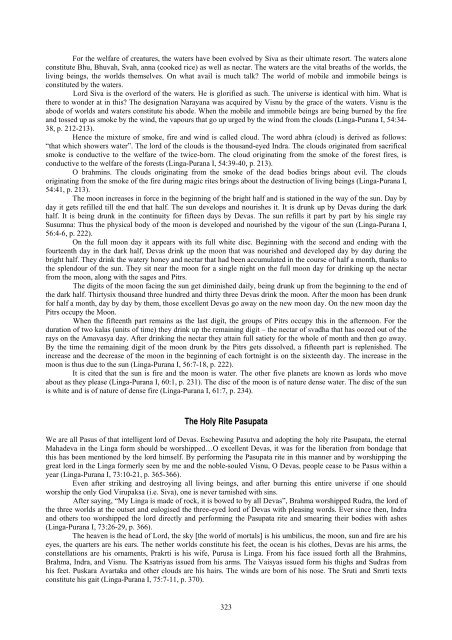
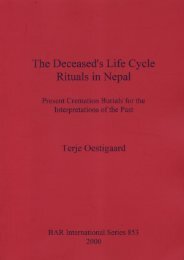


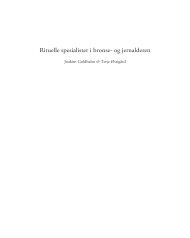
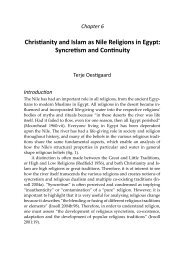
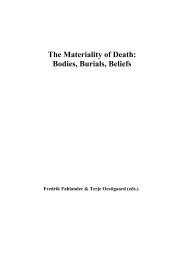


![Fullmono-AK [P2118].indd - oestigaard](https://img.yumpu.com/18994998/1/177x260/fullmono-ak-p2118indd-oestigaard.jpg?quality=85)